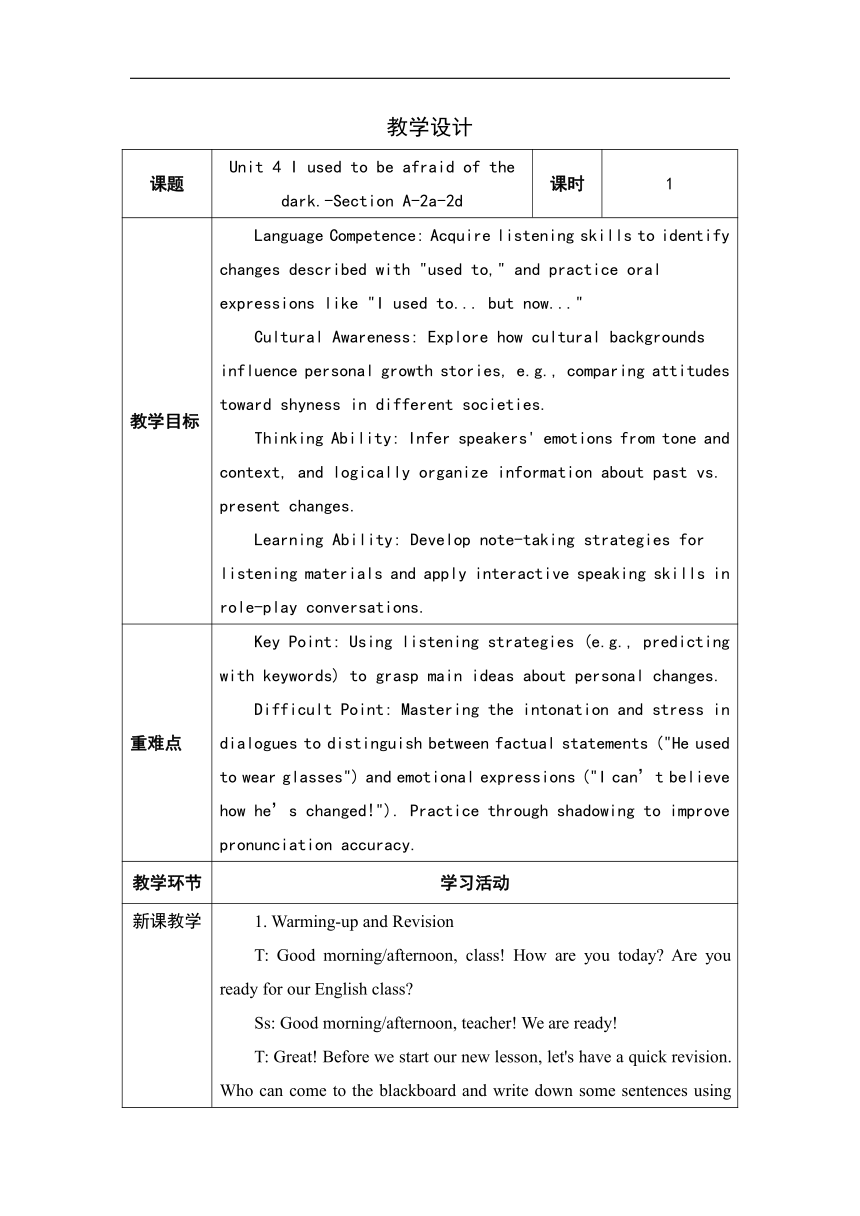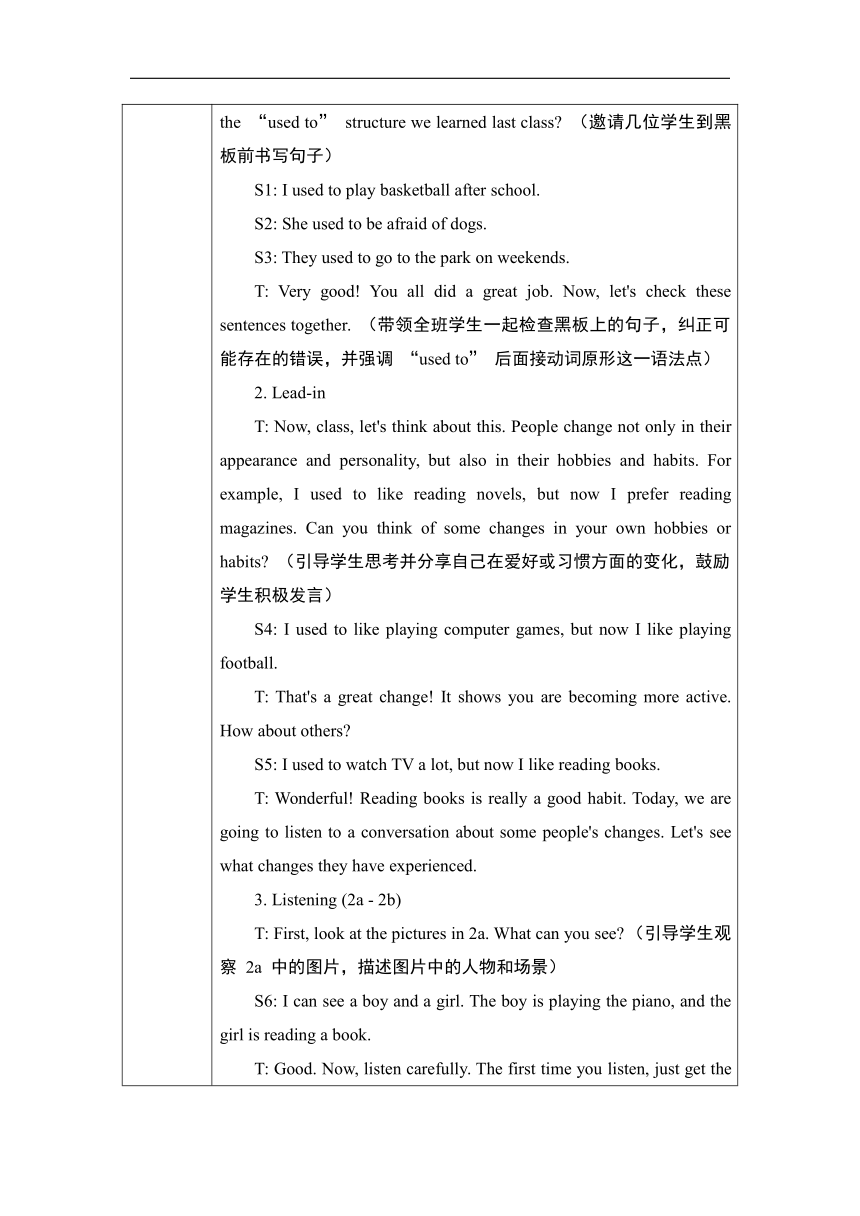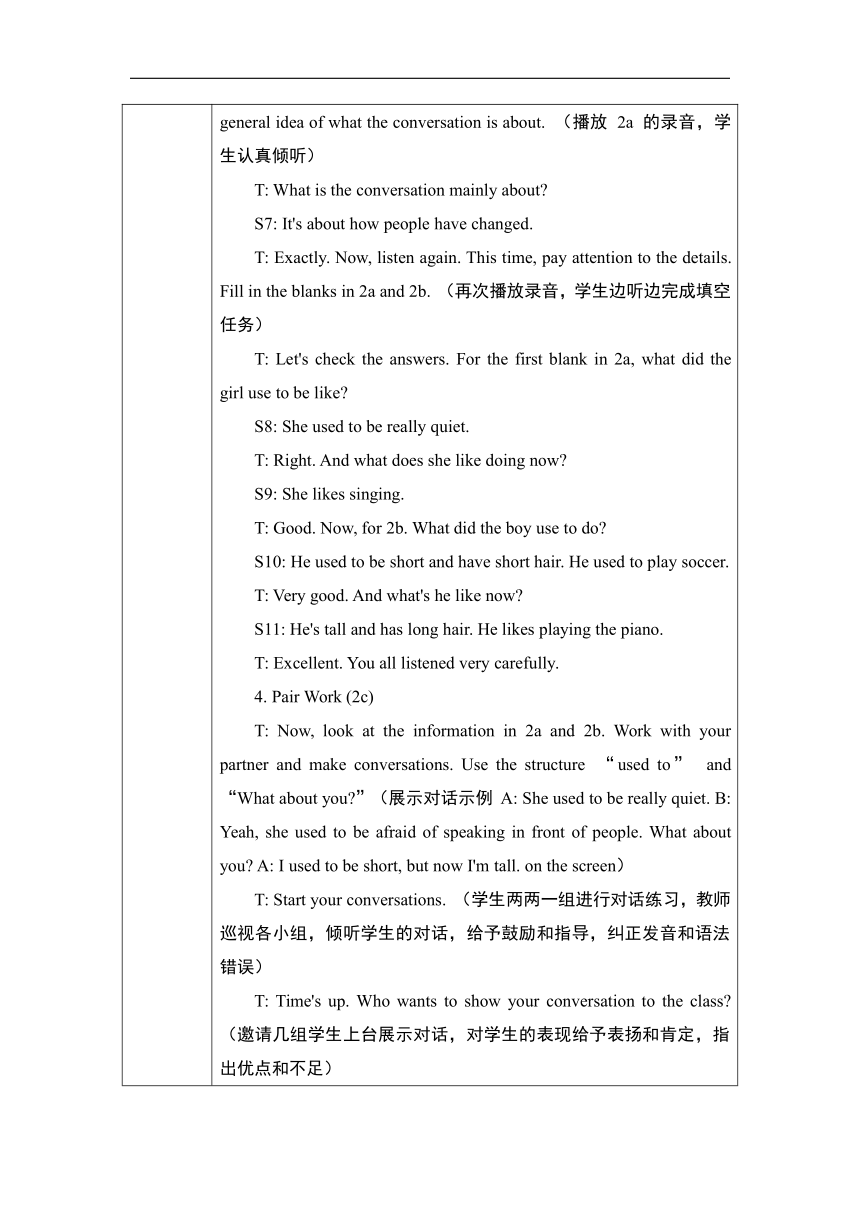Unit 4 I used to be afraid of the dark.SectionA2a-2d教案(表格式) 人教版九年级全册
文档属性
| 名称 | Unit 4 I used to be afraid of the dark.SectionA2a-2d教案(表格式) 人教版九年级全册 |

|
|
| 格式 | docx | ||
| 文件大小 | 27.7KB | ||
| 资源类型 | 教案 | ||
| 版本资源 | 人教新目标(Go for it)版 | ||
| 科目 | 英语 | ||
| 更新时间 | 2025-07-04 21:15:43 | ||
图片预览



文档简介
教学设计
课题 Unit 4 I used to be afraid of the dark.-Section A-2a-2d 课时 1
教学目标 Language Competence: Acquire listening skills to identify changes described with "used to," and practice oral expressions like "I used to... but now..." Cultural Awareness: Explore how cultural backgrounds influence personal growth stories, e.g., comparing attitudes toward shyness in different societies. Thinking Ability: Infer speakers' emotions from tone and context, and logically organize information about past vs. present changes. Learning Ability: Develop note-taking strategies for listening materials and apply interactive speaking skills in role-play conversations.
重难点 Key Point: Using listening strategies (e.g., predicting with keywords) to grasp main ideas about personal changes. Difficult Point: Mastering the intonation and stress in dialogues to distinguish between factual statements ("He used to wear glasses") and emotional expressions ("I can’t believe how he’s changed!"). Practice through shadowing to improve pronunciation accuracy.
教学环节 学习活动
新课教学 1. Warming-up and Revision T: Good morning/afternoon, class! How are you today Are you ready for our English class Ss: Good morning/afternoon, teacher! We are ready! T: Great! Before we start our new lesson, let's have a quick revision. Who can come to the blackboard and write down some sentences using the “used to” structure we learned last class (邀请几位学生到黑板前书写句子) S1: I used to play basketball after school. S2: She used to be afraid of dogs. S3: They used to go to the park on weekends. T: Very good! You all did a great job. Now, let's check these sentences together. (带领全班学生一起检查黑板上的句子,纠正可能存在的错误,并强调 “used to” 后面接动词原形这一语法点) 2. Lead-in T: Now, class, let's think about this. People change not only in their appearance and personality, but also in their hobbies and habits. For example, I used to like reading novels, but now I prefer reading magazines. Can you think of some changes in your own hobbies or habits (引导学生思考并分享自己在爱好或习惯方面的变化,鼓励学生积极发言) S4: I used to like playing computer games, but now I like playing football. T: That's a great change! It shows you are becoming more active. How about others S5: I used to watch TV a lot, but now I like reading books. T: Wonderful! Reading books is really a good habit. Today, we are going to listen to a conversation about some people's changes. Let's see what changes they have experienced. 3. Listening (2a - 2b) T: First, look at the pictures in 2a. What can you see (引导学生观察 2a 中的图片,描述图片中的人物和场景) S6: I can see a boy and a girl. The boy is playing the piano, and the girl is reading a book. T: Good. Now, listen carefully. The first time you listen, just get the general idea of what the conversation is about. (播放 2a 的录音,学生认真倾听) T: What is the conversation mainly about S7: It's about how people have changed. T: Exactly. Now, listen again. This time, pay attention to the details. Fill in the blanks in 2a and 2b. (再次播放录音,学生边听边完成填空任务) T: Let's check the answers. For the first blank in 2a, what did the girl use to be like S8: She used to be really quiet. T: Right. And what does she like doing now S9: She likes singing. T: Good. Now, for 2b. What did the boy use to do S10: He used to be short and have short hair. He used to play soccer. T: Very good. And what's he like now S11: He's tall and has long hair. He likes playing the piano. T: Excellent. You all listened very carefully. 4. Pair Work (2c) T: Now, look at the information in 2a and 2b. Work with your partner and make conversations. Use the structure “used to” and “What about you ” (展示对话示例 A: She used to be really quiet. B: Yeah, she used to be afraid of speaking in front of people. What about you A: I used to be short, but now I'm tall. on the screen) T: Start your conversations. (学生两两一组进行对话练习,教师巡视各小组,倾听学生的对话,给予鼓励和指导,纠正发音和语法错误) T: Time's up. Who wants to show your conversation to the class (邀请几组学生上台展示对话,对学生的表现给予表扬和肯定,指出优点和不足) 5. Reading and Comprehension (2d) T: Next, let's read the conversation in 2d. First, read it by yourselves quickly and try to understand the main idea. (学生自主快速阅读 2d 的对话) T: What is the conversation about S12: It's about a party and how some of their classmates have changed. T: Right. Now, read it again carefully and answer the following questions on the screen. (展示问题 1. Who are talking in the conversation 2. How long has it been since they saw their primary school classmates 3. What did Billy use to be like 4. What did he use to do 5. What's he like now ) T: Let's answer the questions one by one. Who are talking in the conversation S13: Alfred and Gina. T: Good. How long has it been since they saw their primary school classmates S14: Three years. T: Right. What did Billy use to be like S15: He used to be shy. He used to blush when talking to girls. T: Very good. What did he use to do S16: He used to read in the library every day. T: Excellent. And what's he like now S17: He's tall and strong, and he's popular with girls. T: Great. You all understood the conversation very well. 6. Language Points Explanation T: Now, let's learn some important language points in this conversation. (在黑板上写下重点短语和句型,如 used to do sth., be interested in, get good scores, be popular with 等) T: “Used to do sth.”, as we know, is used to talk about past habits or states that are no longer true. For example, He used to be late for school, but now he is always on time. (通过例句进一步解释 “used to do sth.” 的用法) T: “Be interested in” means to have a feeling of wanting to know or learn about something. She is interested in painting. (举例说明 “be interested in” 的用法) T: “Get good scores” means to achieve high marks in an exam. He studied hard and got good scores in the math test. (解释 “get good scores” 的含义,并举例) T: “Be popular with” means to be liked by many people. The singer is very popular with young people. (讲解 “be popular with” 的用法,并举例) T: Let's do some exercises to practice these language points. (展示练习题,让学生完成并核对答案) 7. Group Discussion T: Now, think about your own primary school classmates. How have they changed Discuss in your groups. You can talk about their appearance, personality, hobbies, etc. (学生分组进行讨论,教师巡视各小组,参与学生的讨论,给予引导和帮助) T: Time's up. Each group choose a representative to share your group's ideas with the class. (每组推选一名代表,向全班分享小组讨论的结果) 8. Summary and Homework T: Today, we learned a lot about how people change. We practiced listening, speaking, reading and learned some important language points. Remember, people are always changing, and we can use English to describe these changes. (总结本节课的重点内容) T: For homework, I want you to write a short passage about how one of your primary school classmates has changed. You need to use at least five sentences with the “used to” structure and some of the language points we learned today. And don't forget to bring it to class tomorrow. (布置作业) T: That's all for today's class. Have a nice day! Ss: Thank you, teacher! Have a nice day!
课题 Unit 4 I used to be afraid of the dark.-Section A-2a-2d 课时 1
教学目标 Language Competence: Acquire listening skills to identify changes described with "used to," and practice oral expressions like "I used to... but now..." Cultural Awareness: Explore how cultural backgrounds influence personal growth stories, e.g., comparing attitudes toward shyness in different societies. Thinking Ability: Infer speakers' emotions from tone and context, and logically organize information about past vs. present changes. Learning Ability: Develop note-taking strategies for listening materials and apply interactive speaking skills in role-play conversations.
重难点 Key Point: Using listening strategies (e.g., predicting with keywords) to grasp main ideas about personal changes. Difficult Point: Mastering the intonation and stress in dialogues to distinguish between factual statements ("He used to wear glasses") and emotional expressions ("I can’t believe how he’s changed!"). Practice through shadowing to improve pronunciation accuracy.
教学环节 学习活动
新课教学 1. Warming-up and Revision T: Good morning/afternoon, class! How are you today Are you ready for our English class Ss: Good morning/afternoon, teacher! We are ready! T: Great! Before we start our new lesson, let's have a quick revision. Who can come to the blackboard and write down some sentences using the “used to” structure we learned last class (邀请几位学生到黑板前书写句子) S1: I used to play basketball after school. S2: She used to be afraid of dogs. S3: They used to go to the park on weekends. T: Very good! You all did a great job. Now, let's check these sentences together. (带领全班学生一起检查黑板上的句子,纠正可能存在的错误,并强调 “used to” 后面接动词原形这一语法点) 2. Lead-in T: Now, class, let's think about this. People change not only in their appearance and personality, but also in their hobbies and habits. For example, I used to like reading novels, but now I prefer reading magazines. Can you think of some changes in your own hobbies or habits (引导学生思考并分享自己在爱好或习惯方面的变化,鼓励学生积极发言) S4: I used to like playing computer games, but now I like playing football. T: That's a great change! It shows you are becoming more active. How about others S5: I used to watch TV a lot, but now I like reading books. T: Wonderful! Reading books is really a good habit. Today, we are going to listen to a conversation about some people's changes. Let's see what changes they have experienced. 3. Listening (2a - 2b) T: First, look at the pictures in 2a. What can you see (引导学生观察 2a 中的图片,描述图片中的人物和场景) S6: I can see a boy and a girl. The boy is playing the piano, and the girl is reading a book. T: Good. Now, listen carefully. The first time you listen, just get the general idea of what the conversation is about. (播放 2a 的录音,学生认真倾听) T: What is the conversation mainly about S7: It's about how people have changed. T: Exactly. Now, listen again. This time, pay attention to the details. Fill in the blanks in 2a and 2b. (再次播放录音,学生边听边完成填空任务) T: Let's check the answers. For the first blank in 2a, what did the girl use to be like S8: She used to be really quiet. T: Right. And what does she like doing now S9: She likes singing. T: Good. Now, for 2b. What did the boy use to do S10: He used to be short and have short hair. He used to play soccer. T: Very good. And what's he like now S11: He's tall and has long hair. He likes playing the piano. T: Excellent. You all listened very carefully. 4. Pair Work (2c) T: Now, look at the information in 2a and 2b. Work with your partner and make conversations. Use the structure “used to” and “What about you ” (展示对话示例 A: She used to be really quiet. B: Yeah, she used to be afraid of speaking in front of people. What about you A: I used to be short, but now I'm tall. on the screen) T: Start your conversations. (学生两两一组进行对话练习,教师巡视各小组,倾听学生的对话,给予鼓励和指导,纠正发音和语法错误) T: Time's up. Who wants to show your conversation to the class (邀请几组学生上台展示对话,对学生的表现给予表扬和肯定,指出优点和不足) 5. Reading and Comprehension (2d) T: Next, let's read the conversation in 2d. First, read it by yourselves quickly and try to understand the main idea. (学生自主快速阅读 2d 的对话) T: What is the conversation about S12: It's about a party and how some of their classmates have changed. T: Right. Now, read it again carefully and answer the following questions on the screen. (展示问题 1. Who are talking in the conversation 2. How long has it been since they saw their primary school classmates 3. What did Billy use to be like 4. What did he use to do 5. What's he like now ) T: Let's answer the questions one by one. Who are talking in the conversation S13: Alfred and Gina. T: Good. How long has it been since they saw their primary school classmates S14: Three years. T: Right. What did Billy use to be like S15: He used to be shy. He used to blush when talking to girls. T: Very good. What did he use to do S16: He used to read in the library every day. T: Excellent. And what's he like now S17: He's tall and strong, and he's popular with girls. T: Great. You all understood the conversation very well. 6. Language Points Explanation T: Now, let's learn some important language points in this conversation. (在黑板上写下重点短语和句型,如 used to do sth., be interested in, get good scores, be popular with 等) T: “Used to do sth.”, as we know, is used to talk about past habits or states that are no longer true. For example, He used to be late for school, but now he is always on time. (通过例句进一步解释 “used to do sth.” 的用法) T: “Be interested in” means to have a feeling of wanting to know or learn about something. She is interested in painting. (举例说明 “be interested in” 的用法) T: “Get good scores” means to achieve high marks in an exam. He studied hard and got good scores in the math test. (解释 “get good scores” 的含义,并举例) T: “Be popular with” means to be liked by many people. The singer is very popular with young people. (讲解 “be popular with” 的用法,并举例) T: Let's do some exercises to practice these language points. (展示练习题,让学生完成并核对答案) 7. Group Discussion T: Now, think about your own primary school classmates. How have they changed Discuss in your groups. You can talk about their appearance, personality, hobbies, etc. (学生分组进行讨论,教师巡视各小组,参与学生的讨论,给予引导和帮助) T: Time's up. Each group choose a representative to share your group's ideas with the class. (每组推选一名代表,向全班分享小组讨论的结果) 8. Summary and Homework T: Today, we learned a lot about how people change. We practiced listening, speaking, reading and learned some important language points. Remember, people are always changing, and we can use English to describe these changes. (总结本节课的重点内容) T: For homework, I want you to write a short passage about how one of your primary school classmates has changed. You need to use at least five sentences with the “used to” structure and some of the language points we learned today. And don't forget to bring it to class tomorrow. (布置作业) T: That's all for today's class. Have a nice day! Ss: Thank you, teacher! Have a nice day!
同课章节目录
- Unit 1 How can we become good learners.
- Section A
- Section B
- Unit 2 I think that mooncakes are delicious!
- Section A
- Section B
- Unit 3 Could you please tell me where the restroom
- Section A
- Section B
- Unit 4 I used to be afraid of the dark.
- Section A
- Section B
- Unit 5 What are the shirts made of?
- Section A
- Section B
- Review of Units 1-5
- Unit 6 When was it invented?
- Section A
- Section B
- Unit 7 Teenagers should be allowed to choose their
- Section A
- Section B
- Unit 8 It must belong to Carla.
- Section A
- Section B
- Unit 9 I like music that I can dance to.
- Section A
- Section B
- Unit 10 You're supposed to shake hands.
- Section A
- Section B
- Review of Units 6-10
- Unit 11 Sad movies make me cry.
- Section A
- Section B
- Unit 12 Life is full of the unexpected
- Section A
- Section B
- Unit 13 We're trying to save the earth!
- Section A
- Section B
- Unit 14 I remember meeting all of you in Grade 7.
- Section A
- Section B
- Review of Units 11-14
